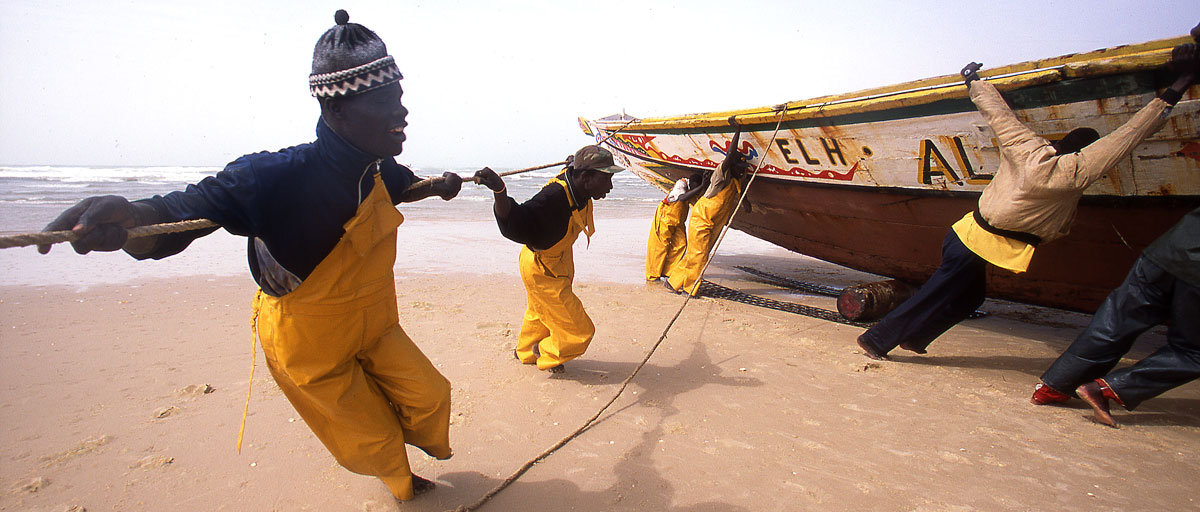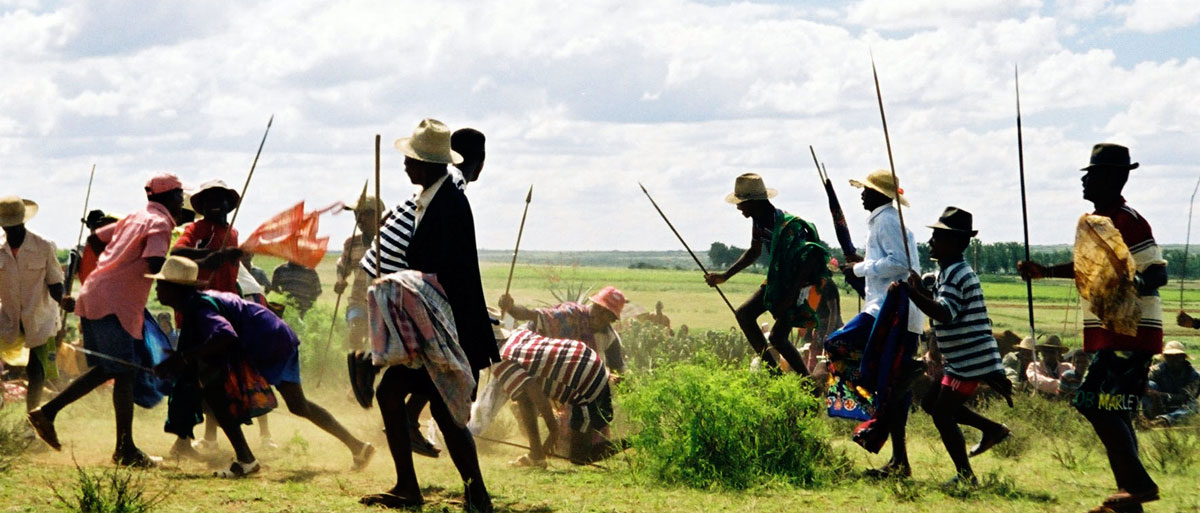
International development efforts and science is slowly shifting from viewing the environment as an externality to the biosphere and more as a precondition for social justice, economic development, and sustainability. Photo: N. Desagher/Azote
sustainability science
A social-ecological legacy
An integrated perspective of humans-in-nature more important than ever for both science and development
- The concept “social-ecological system” has been in use for almost two decades in the scientific literature
- Centre researchers present how this approach has developed over the years and why it is more important than ever both in science and development efforts
- It is high time to view the biosphere as a precondition for social justice, economic development, and sustainability
Already two decades ago centre science director Carl Folke and Canadian professor Fikret Berkes started to use the concept “social-ecological system” as part of an integrated perspective of humans-in-nature. They related it to the, at that time, emerging concept of resilience. Since then a lot has happened in the research on resilience in social-ecological systems. Today, with the new Sustainable Development Goals and a revived global environmental change research agenda this approach is as pertinent as ever.
In fact, the focus of international development efforts and science is slowly shifting from viewing the environment as an externality to the biosphere as a precondition for social justice, economic development, and sustainability.
This is the message from an article in Ecology and Society by Carl Folke, Reinette Biggs, Albert Norström, Belinda Reyers and Johan Rockström where they present how the social-ecological approach has developed over the years and why it is more important than ever.
"The social-ecological resilience approach emphasizes that humans and well-being fundamentally rest on the capacity of the biosphere to sustain us, irrespective of whether or not people recognize this dependence."
Carl Folke, lead author
From ecological economics
Things have, however, not always been like this. Three decades ago, in the mid-1980s, when the field of ecological economics was developed, it was often said that “ecologists pretended as if humans did not exist and economists as if nature did not exist”. Considering this, there has indeed been huge progress. Today, there in an increasing acknowledgement that people and nature are interdependent.
“It should now be obvious that humans and our societies depend on resources and services of the biosphere. It should also be obvious that ecological processes and patterns can no longer be explained without considering the human influences in these,” Carl Folke and his co-authors concludes.
The social-ecological approach did, however, not emerge from nowhere in 1998 when Folke and Berkes first published their book Linking social and ecological systems.
The current article in Ecology and Society describes the long legacy of the approach and how it drew on the development of ecological economics and work by scholars like Kenneth Boulding, Herman Daly and the Odum brothers. Already in this work, it was made explicit that the economy is a subsystem of society, which in turn is a subsystem of the biosphere.
Examples from Madagascar and Maine
The article features two main examples of why the social-ecological systems approach is so important, one from southern Madagascar’s agricultural landscapes and one from the lobster fisheries in Maine, USA. The Madagascar case reflects a very tangible example of a social-ecological system where culture and nature are clearly intertwined and continue to coevolve. The Maine case, on the other hand, reveals how “success” in terms of maximizing abundance and economic value of lobsters may mask vulnerability across the broader social-ecological system.
“One may argue that the Maine case serves as a microcosm of the global situation facing humanity in the Anthropocene, where development paradigms have generally forgotten the significance of the biosphere for human well-being,” the authors write.
The lobster fisheries of Maine has not been overexploited and is often described as an iconic example of human collaboration, from individual fishers to global markets. However, with a social-ecological systems approach another picture emerges: Centuries of intense fishing has removed the lobsters’ predators, like cod and haddock, to such an extent that the lobster population has grown into a widespread monoculture with low resilience to disturbance. South of Maine, lobster abundance has dropped more than 70 per cent due to a disease related to increased water temperatures. If this disease spread to Maine the coastal fishing villages would face turbulent times.
In Madagascar, the landscape is to a large extent very degraded, but small remnants of forests with unique and endemic species, like lemurs, are preserved. Extending the analysis from an ecological scope to a social-ecological approach has revealed that these patches are sacred sites where ancestors of the local inhabitants have been buried. As a consequence, these forests are culturally protected by taboos and today their diversity and ecosystem services is critical to local livelihood and appreciated by people around the world.
"Clearly, neither the ecosystem nor culture alone delivers the ecosystem services to society; the services emerge in their relations, consciously or unconsciously. It is a coevolved, intertwined social-ecological system,” the authors conclude.
Although both these cases are local they are strongly influenced and shaped by global-scale changes, both social and ecological. The Maine lobster fishery is, for example, tied to global markets and vulnerable to changes in the global economy.
Stewardship needed more than ever
In short Carl Folke and his colleagues stress that we need to be wise stewards of forests, coral reefs, grasslands and other ecosystems to secure long-term sustainability and dignity for people in diverse contexts and places. Why? Because the separation of social and natural systems in science and development approaches is false and uninformed.
“Social conditions, health, culture, democracy, power, justice, equality, matters of security, and even survival are interwoven with the global ecological system in a complex interplay of local, regional, and worldwide dependencies,” they explain.
So, it is high time (or maybe it has been for two decades) to “reconnect approaches and perspectives on development to the biosphere foundation,” as the authors put it. It is simply a precondition for sustainability for people on Earth and for reaching the Sustainable Development Goals. And we need a biosphere-based sustainability science to support this.
Folke, C., R. Biggs, A. V. Norström, B. Reyers, and J. Rockström. 2016. Social-ecological resilience and biosphere-based sustainability science. Ecology and Society 21(3):41.
Carl Folke is science director of the Stockholm Resilience Centre. He has extensive experience in transdisciplinary collaboration and has worked with ecosystem dynamics and services as well as the social and economic dimension of ecosystem management and proactive measures to manage resilience.
Reinette (Oonsie) Biggs' is a Society in Science Fellow funded by the Branco Weiss foundation. Her research focuses on regime shifts — large, abrupt, long-lasting changes that can have dramatic impacts on human economies and societies.
Albert Norström is Executive Director of the Programme on Ecosystem Change and Society (PECS) and a researcher with a focus on coastal and marine systems.
Belinda Reyers is the Director of the GRAID (Guidance for Resilience in the Anthropocene: Investments for Development) programme at the Stockholm Resilience Centre. Her research involves regional and international collaborations which aim to integrate knowledge on social-ecological systems and their role in supporting resilient societies into the policies and practices of decision makers.
Johan Rockström is the executive director of the Stockholm Resilience Centre and an internationally recognized scientist for his work on global sustainability issues.








